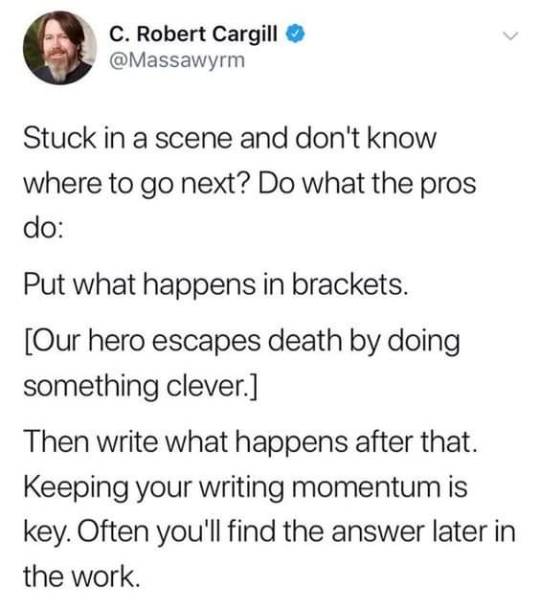Greetings. My name is Jens. This blog is for my own writing and writing resource material that I have either made or found. My main blog is @jack-trickster so you can reach me there, here or via [email protected].
Don't wanna be here? Send us removal request.
Link
hey, @bunjywunjy - this might be your jam (and any other dinosaur enthusiasts, it’s a heck of a read)
160K notes
·
View notes
Photo


Hollywood dehumanizes people of color on screen using racist media narratives in order to justify oppression and violence against people of color in real life. These comics touch on a lot of complicated subjects about race and gender in media, but I realized mainstream representation metrics like the Bechdel-Wallace Test, Riz Test, DuVernay Test, and Aila Test don’t fully cover the criteria to discuss those issues, so I made a test of my own.

I didn’t want to name it after myself at first, but after years of experience in both comics and Hollywood and having my work and ideas stolen and reposted online too many times to count, I know that no one will give you credit unless you claim it, so I decided to put my name on it. These are just a few of many stereotypical roles for POC but there are others, all designed to depict POC as inferior. Overall, the purpose of Hollywood is to produce propaganda to benefit cis-het white men—by lying about how pure and good they are—at the expense of everyone else. Basically, films are required to fail this test in order to reach the screen—even with leads of color. Let’s use Asian American films as examples: To All The Boys fails 1, 4 and 6. The Big Sick fails 2, 4 and 5. Always Be My Maybe fails 6. It’s hard to think of a film that passes. Some say representation is a frivolous concern, but the fact is that movies and TV are not an escape from reality—they tell us what our reality should be. Media messaging is an integral part of the systems that perpetuate state violence and oppressive policies against POC. That’s why having tests like these matter—it forces us to think deeply about the kind of content we’re creating and consuming, and to push harder to do better. It requires that the world sees POC and other marginalized people as people, and to treat us that way, both on screen and off. Note: I didn’t include non-binary POC in the comics because they tend to not get roles at all, and if they do, are usually put into either the men or women category. I also didn’t include white women, who are dehumanized as women but differently than WOC due to white supremacy. (Please don’t repost or edit my art. Reblogs are always appreciated.) If you enjoy my comics, please pledge to my Patreon or donate to my Paypal. I lost my publisher for trying to publish these strips, so your support keeps me going until I can find a new publisher/lit agent https://twitter.com/Joshua_Luna/status/1134522555744866304 https://patreon.com/joshualuna https://www.paypal.com/paypalme2/JoshuaLunaComics
11K notes
·
View notes
Photo
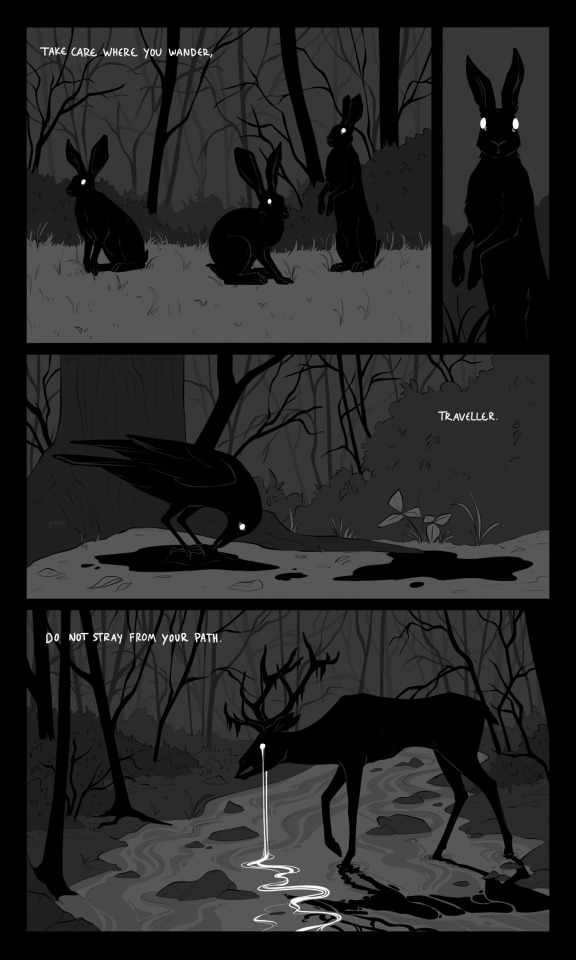
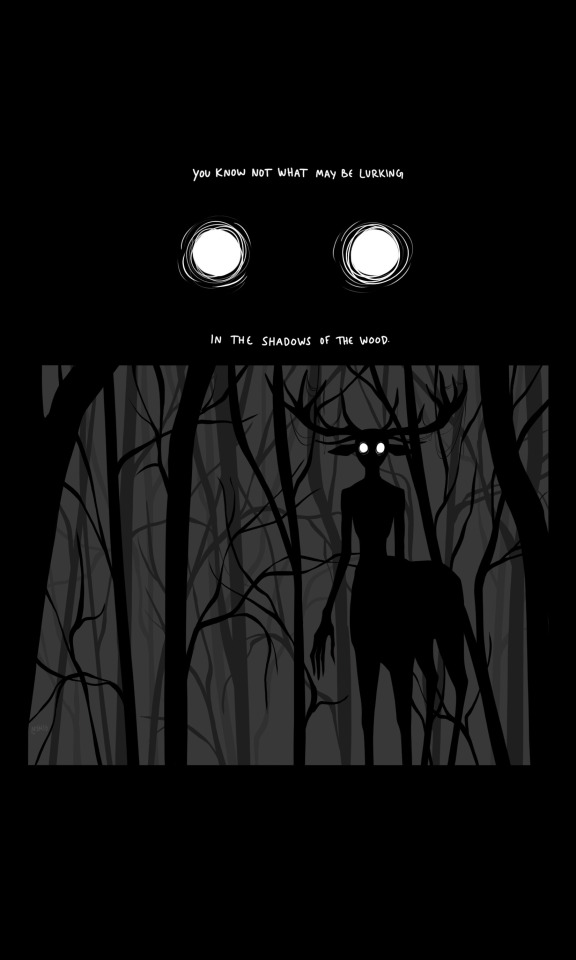
The woods are lovely, dark and deep 🍃🍂
134K notes
·
View notes
Text
A depressed guy moves into a haunted house with 7 demons, each corresponding to a deadly sin. But, they’re all trying to help him get back on his feet; Pride helps with self confidence, Lust helps him get laid, etc.
377K notes
·
View notes
Text
How to teach yourself linguistics online for free
Wish you were enrolled in an intro linguistics class this semester? Starting a linguistics major and looking for extra help? Trying to figure out whether you should study linguistics and what comes after? Whether you’re just trying to grasp the basics of linguistics or you’re trying to construct a full online linguistics course, here’s a comprehensive list of free linguistics websites, podcasts, videos, blogs, and other resources from around the internet:
Linguistics Podcasts
Specific episodes:
The International Phonetic Alphabet and vowels
Constituency
Gricean Maxims and presuppositions
Kids These Days aren’t ruining language
Learning languages linguistically
Phonemes and palatalization
Prepositions, determiners, verbs
Morphemes and the wug test
Why do we gesture when we talk?
Syllables
Podcasts in general:
Lingthusiasm
The History of English Podcast
Talk the Talk
Lexicon Valley
The World in Words
A Way With Words
Vocal Fries
Linguistics Videos
Modular topics:
NativLang (cartoons)
The Ling Space
Tom Scott’s Language Files
Arika Okrent (whiteboard videos)
Structured video series like an online course:
Introduction to Linguistics (TrevTutor)
Another intro linguistics series (DS Bigham)
Phonology (TrevTutor)
Mathematical linguistics (TrevTutor)
Syntax (TrevTutor)
Another syntax series following the chapter structure of a free online syntax textbook (Caroline Heycock)
The Virtual Linguistics Campus at Marburg University
“Miracles of Human Language” (on Coursera from Leiden University)
Blog posts
General
How much do I need to know before taking intro linguistics? (Spoiler: not much)
28 tips for doing better in your intro linguistics course
How to find a topic for your linguistics essay or research paper
For typesetting linguistics symbols: What is LaTeX and why do linguists love it? (with sample LaTeX doc to download and modify).
Further linguistics resources about specific areas, such as sociolinguistics, psycholinguistics, language acquisition (first/second), historical linguistics, neurolinguistics, prescriptivism.
Phonetics & Phonology
How to make your own paper model of the larynx
Teaching phonetics using lollipops
How to remember the IPA vowel chart
How to remember the IPA consonant chart
IPA transcription practice
A detailed explanation of sonorants, obstruents, and sonority
A very elaborate Venn diagram of English phonological features
The basics of how Optimality Theory works, with coffee analogy
Allophones of /t/, explained with internet gifs
Several good visualizations and explanations of the vocal tract
How to type IPA on your phone (Android and iOS)
Various ways to type IPA on a computer
Morphology & Syntax
Morphological typology cartoons
So you asked the internet how to draw syntax trees. Here’s why you’re confused.
Types of trees: a sentence is an S, a sentence is an IP, a sentence is a TP
A step-by-step guide to drawing a syntax tree, with gifs
Distributed Morphology
Garden path sentences: how they work, some examples
Structural ambiguity and understanding people in Ipswich
How to draw trees on a computer (TreeForm and phpSyntaxTree)
Pronoun typology and “the gay fanfiction problem”
The solution to violent example sentences: Pokemon
Semantics & Pragmatics
The difference between epistemic and deontic, necessity and possibility (with bonus modals as Hogwarts houses)
Why learn semantics? Comebacks to annoying people.
Presuppositions, implicature and entailment, and more presuppositions in Lizzie Bennet Diaries
Gricean maxims in Welcome to Night Vale
Scalar implicature and a duck gif
Giving a shit about Negative Polarity Items, NPIs explained using Mean Girls references, and a follow-up on Free Choice Items
The lambda calculus for absolute dummies
The Lambda Calculator (software for practising in Heim & Kratzer style)
Teaching & Academic/career advice
Linguistics resources for high school teachers
Teaching linguistics to 9-14 year olds
On writing an IB extended essay in linguistics (& follow-up)
IPA Bingo
IPA Jeopardy and IPA Hangman
Practising syntax trees using cards and string/straws
Find a linguistics olympiad near you!
Editing linguistics Wikipedia articles instead of writing a final paper that no one but the prof will read (see also wikiedu.org)
Should you go to grad school in linguistics? Maybe
Figuring out if you actually want to go to linguistics grad school
How to decide which linguistics grad school to go to
How to look for linguistics undergrad programs
How to interact with someone who’s just given a talk
An extensive list of undergrad and/or student-friendly conferences - apply to one near you!
Advice for linguistics profs on increasing enrollment and supporting non-academic careers
Linguistics jobs - a series about careers outside academia
Languages
Linguistic approaches to language learning resource roundup
Will linguistics help with language learning? / Will learning a second language help with linguistics?
The problem with “economically useful” as a reason for language learning
Further link roundups
This list not enough? Try these further masterposts:
A very long list of linguistics movies, documentaries, and TV show episodes
A list of books (fiction and nonfiction) about linguistics
A comprehensive list of language and linguistics podcasts, from Superlinguo
A very long list of linguistics YouTube channels and other free online videos about linguistics
20 linguistics blogs I recommend following
How to explain linguistics to your friends and family this holiday season
17K notes
·
View notes
Text
Tarot in Spells
this is a list of magical associations for every tarot card, they can be added into spells to amplify your intentions and strengthen your manifestations
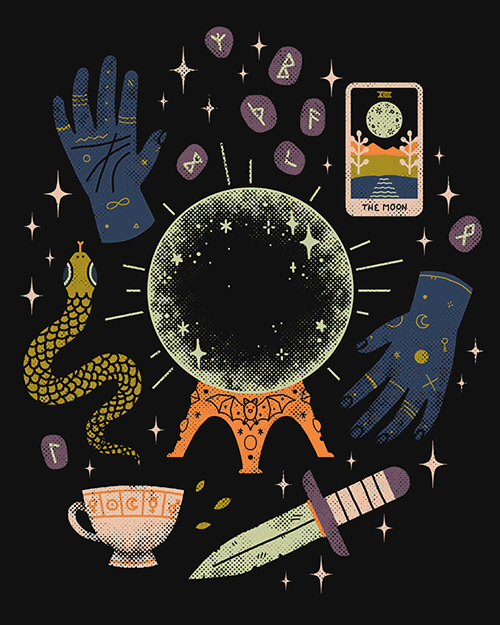
Wands are connected with the Fire element and is centered around movement, direction, energy, passion
Swords deal with thinking, communication, perception, and issues dealing with truth, connected to the air element
Cups are connected with water, and the full spectrum of emotions. every emotion imaginable is covered in the cup’s suit.
Pentacles are connected with Earth and are symbolic of manifestation, rewards, material wealth and material abundance.
The Fool creates new beginnings and can be paired with other cards. ex: the fool + the lovers for new romance, the fool + pentacles for new opportunities, etc.
The Magician increases your power and capability on all levels, willpower, emotional security, balance within yourself, etc.
The High Priestess increases your psychic abilities, mediumship abilities, and intuition
The Empress will help you with creativity and creative endeavors
The Emperor establishes order, structure, and command
The Hierophant can be used in a lot of ways, my favorites are 1. Pairing it with the fool to attract a new mentor, 2. Using it to summon a spirit guide or ascended master
The Lovers help invoke and attract love, partnership, mutual relationships, and passion
The Chariot is amazing for success, and triumph. I always use this in success spells for exams, tests, and projects. The Chariot will help the best possible outcome for a situation to arise
Strength will help you master your emotions
The Hermit is good for rituals and meditations based going within and gaining a better understanding of your own self, and life purpose.
The Wheel of Fortune can be used for luck, change, and getting a desired situation moving
Justice is great for truth, legal matters, and justice
The Hanged Man buys you time for a situation you aren’t ready to face, delays events
The Death card works well for ending situations, closing doors, gaining closure, and new beginnings
Temperance will restore balance and serenity to any situation
The Tower is best used for hexing and cursing, brings misfortune, unhappiness and chaos
The Star card is good for when you are casting spells focused on gaining something, The Star card is centered around healing, openness, and hope
The Moon helps develops intuitive abilities and can be used to send bad dreams
The Sun is used in spells for summoning happiness, success, and health
Judgement will help clear confusion and help you with understanding your life mission similar to the Hermit in that aspect
The World invokes wholeness and completion
Page of Wands: works with communication, messages, action, and passion
Page of Cups: boosts creativity, taps into your spiritual nature to bring out new creativity
Page of Swords: amplifies ingenuity and creativity, helps deliver messages from one person to another, can be used to attract someone’s attention to yourself
Page of Pentacles: good for grounding and centering spell work
Knight of Wands: speeds up any workings involving passion, love, and creativity
Knight of Cups: speeds up workings dealing with emotions, psychic development, inner strength
Knight of Swords: speeds up workings involving communication, balance, and thinking
Knight of Pentacles: speeds up workings dealing with manifesting abundance, material wealth, prosperity, and creativity
King of Wands: associated with leadership, command, can help you gain authority
King of Cups: associated with personal feelings, can help you resolve personal conflicts and inner turmoil
King of Swords: aids in strengthening your communication and speaking skills
King of Pentacles: invokes luxury, great card for business success
Queen of Wands: establishes a sense of self security and sufficiency
Queen of Cups: develops your psychic abilities, also helps with understanding/controlling your emotions
Queen of Swords: helps you develop stronger focus
Queen of Pentacles: abundance, creativity, fertility
Aces: used for new beginnings based on the energy represented in that suit
Two of Wands: positive progress in any situation whether it be romance, health, career, etc.
Three of Wands: business prosperity
Four of Wands: strengthens any type of relationship
Five of Wands: used in hexes and curses to invoke conflict, and arguments
Six of Wands: manifests recognition, success,
Seven of Wands: use this card when you’re in a tough situation, it will help you succeed and come out of it stronger
Eight of Wands: directs energy and intentions towards a specific goal or purpose, helps to speed up workings
Nine of Wands: use this card when you come face to face with a difficult task, this card will keep you brave and strong
Ten of Wands: can either be used to achieve something great, or it can be used in a hex or curse to manifest burdens
Two of Cups: union, strengthens romantic relationships
Three of Cups: strengthens a friendship
Four of Cups: dissatisfaction with surroundings
Five of Cups: causes despair and sadness
Six of Cups: lifts your mood when you’re feeling down
Seven of Cups: illusions and deceptions
Eight of Cups: used to help you move on from the past
Nine of Cups: make a wish and use this card’s power to grant your wish, invokes happiness
Ten of Cups: brings happiness to relationships of all kinds, friends, family, romantic, etc.
Two of Swords: used in curses and hexes to cause someone to have a limiting mindset
Three of Swords: heartbreak and emotional strife
Four of Swords: used in healing spells, sleeping aid
Five of Swords: manifests conflict, and failed success
Six of Swords: this card will aid you when you face a difficult change, helps you to move on and move forward
Seven of Swords: causes betrayal
Eight of Swords: powerful energy that causes isolation
Nine of Swords: sends nightmares and anxieties
Ten of Swords: defeat and betrayal
Two of Pentacles: brings balance
Three of Pentacles: strengthens business connections
Four of Pentacles: manifests financial stability
Five of Pentacles: financial problem
Six of Pentacles: prosperity
Seven of Pentacles: material abundance
Eight of Pentacles: if you’ve worked hard this card ensures you that your efforts will be rewarded
Nine of Pentacles: success, luxury, accomplishment
Ten of Pentacles: success, wealth
Negative aspects of the cards can be used for hexing and cursing
37K notes
·
View notes
Text
Temples are built for gods. Knowing this a farmer builds a small temple to see what kind of god turns up.
406K notes
·
View notes
Text
Writing Alcohol Responsibly
Look I’ve been reading and watching a lot of stuff lately where alcohol is written weird so I’m going to share some fun facts about alcohol to help out y’all who don’t drink or don’t drink certain drinks or whatever. My credentials on this are that I used to drink a lot and I drank all the things.
In America we have girly drinks and masculine drinks because we are obsessed with the gender binary. A man who orders an apple martini is going to be mocked by his friends or he’s a gay man from a 90’s sitcom. In other countries, like in the carribbean, they don’t really gender drinks like we do. If a drink tastes good, drink it.
On that note, drinking culture is different depending on where you are in the US. Referencing a bonfire in a cornfield is going to elicit images of stolen whiskey and cheep beer amongst people in my age group here in the south/midwest but probably won’t for my Chicago friends. Research your region and see what sort drinking cultures they have. Or ask me. I can be a resource.
Frats have a ton of booze. Always. Sororities do too, but they tend to be the pregamers. frats are the ones with secret jungle juice recipes.
ALCOHOL TASTES GROSS. When you first start drinking it’s gross. If you give up drinking like I did and start again it’s gonna taste a little gross again. People who drink HEAVY and/or often don’t notice this that much. They notice the taste of the liquor more, not the alcohol. This is partly because they know how to drink the alcohol.
Keep note of how many drinks your character has per chapter/scene. Remember the great gatsby? Go pick a chapter and highlight every instance they have a drink. THESE PEOPLE WERE DRUNK THE ENTIRE TIME! For a tv example, watch any scene of the vampire diaries/the originals. Everyone is drunk in these shows. It explains a lot, but if your character just like to have a casual glass and not get drunk, why are they drinking all the time?
On that note, the amount of alcohol needed to get you drunk depends on two things: your metabolism and how much you drink. When I was drinking heavily, I would go through two bottles of wine to get drunk (look I said I stopped don’t judge me) these days I get tipsy after a glass. If your character drinks a lot they can drink more without getting drunk. If your character hasn’t drank before or doesn’t drink heavily, they might be more of a lightweight.
Also, a lightweight is a term used to refer to someone who doesn’t need a lot of liquor to get drunk. In the Midwest and southern US, we mock these people in group settings, but silently envy them because they will have a great time without going broke.
Speaking of money, drinking is expensive. Decent vodka will be about $20 and decent whiskey is about $25 and those are just for fifths (the stereotypical bottle size you imagine when thinking about alcohol). Going to bars and clubs can be even more expensive. You have to pay a cover charge to get in and then the drinks plus tips after that and the drinks, like food at a restaurant, are more expensive than staying home and making your own cocktails.
People put out for free drinks. Think April Ludgate conning men at the snakehole Lounge in parks and rec. That really happens.
There are bars with mechanical bulls. Not sure if more common in my region or…
Most young adults binge drink. That means they drink like four or more drinks in a night (four drinks is actually a lot). I think a lot of this has to do with college. Older adults tend to be more casual and social drinkers.
Different alcohol affects people differently. I can drink red wine and aside from a hangover be fine. My friend will drink red wine and get sick.
Hangovers also affect everyone differently. I get headaches and stomache aches and heartburn (if a super sugary wine cooler or cocktail) and my friend will spend the entire morning with a stomach bug from both ends. Some hangovers last an hour some a morning some can last all day.
Most people prefer to eat bread and/or super greasy food the morning after drinking to help the hangover. Some just drink Gatorade. Some drink a little more liquor, this method is referred to as “hair of the dog”
The term white girl wasted is used to refer to ANYONE who is acting like a stereotypical “white girl wasted”. Tends to be someone who gets very loud, starts talking with a valley girl accent, gets very emotional, etc. they’re pretty fun people when you’re drinking. They’re not fun to babysit. This is a modern term.
Pregaming is another modern term. It’s when you get buzzed/drunk before a party or bar and then continue to drink. Another modern term. Another thing more common amongst younger adults.
And that’s all I have for right now. Idk. Send me questions if you have them or if there’s a certain aspect of drinking I should explain more.
Okay thanks for reading. Good luck with your writing!
1K notes
·
View notes
Text
Gnoll (a D&D 5e Race)

(Artwork by @that-darn-hyena )
Gnolls, a race ranging from demonspawn to excitable hyenafolk. Gnolls are easily identified by their yipping laughter and voracious appetites.
Racial Attributes
Ability Score Increase: +2 Constitution
Age: gnolls reach physical maturity about the same age as humans and can live as long as 150yrs, but typically live around 80-90.
Alignment: gnolls come from nomadic societies that idealize chaotic demons and deities. They lean towards chaotic alignments.
Size: gnolls range from five to eight feet tall, averaging around seven feet tall.
Speed: your base walking speed is 30ft.
Darkvision: your time at night on the savannah has accustomed you to dark areas. You can see dim light within 60ft of you as bright light, and darkness as if it were dim light. You can’t discern color in darkness, only shades of gray.
Gnollish Instinct: you have proficiency in the Perception and Insight skills.
Bite: you are proficient with a bite attack as a natural weapon, dealing 1d6 piercing + your strength modifier.
Gnollish Diet: you have a different set of rules for your body when it comes to what you can eat. Raw meat does not have to be cooked, and you automatically overcome any save against rotted or difficult to digest food. Additionally, you have advantage against saves caused by poison, and are immune to the poison condition.
Languages: you speak, read, and write common and up to one other language.
Savannah Gnoll
You are a denizen of the savannah, one who likely worshipped the Celebrant. Savannah gnolls love festival and celebration and want all take part with them.
Ability Score Increase: your Charisma score increases by 1.
Festive Magic: you learn the cantrip Prestidigitation and the first level spell Faerie Fire. Charisma is your modifier for casting this spell, and once you’ve cast Faerie Fire you cannot cast it again until you’ve taken a short or long rest.
Aardwolf
The most nomadic of the gnolls, aardwolf gnolls know the land best and easily find the best (and safest) ways to travel.
Ability Score Increase: your Dexterity score increases by 1.
Savannah Nomads: Whenever you make a Survival, Perception, or Investigate check to forage into or related to the wilds, you may add your proficiency bonus to the roll. If you are already proficient, you may add that bonus again.
Fang of Yeenoghu
You are a demonspawn of the Abyss, with fur tinged white and claws stained black. You hunger for flesh at all hours of the day and are filled with unholy strength.
Ability Score Increase: your Strength score increases by 1
Rampage: if you would reduce an enemy to 0 hitpoints you may immediately move up to half of your movement and make a bite attack.
1K notes
·
View notes
Text
Resources For Writing Sketchy Topics
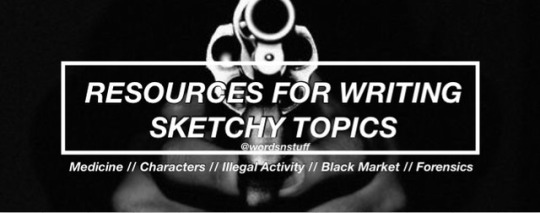
Medicine
A Study In Physical Injury
Comas
Medical Facts And Tips For Your Writing Needs
Broken Bones
Burns
Unconsciousness & Head Trauma
Blood Loss
Stab Wounds
Pain & Shock
All About Mechanical Injuries (Injuries Caused By Violence)
Writing Specific Characters
Portraying a kleptomaniac.
Playing a character with cancer.
How to portray a power driven character.
Playing the manipulative character.
Portraying a character with borderline personality disorder.
Playing a character with Orthorexia Nervosa.
Writing a character who lost someone important.
Playing the bullies.
Portraying the drug dealer.
Playing a rebellious character.
How to portray a sociopath.
How to write characters with PTSD.
Playing characters with memory loss.
Playing a pyromaniac.
How to write a mute character.
How to write a character with an OCD.
How to play a stoner.
Playing a character with an eating disorder.
Portraying a character who is anti-social.
Portraying a character who is depressed.
How to portray someone with dyslexia.
How to portray a character with bipolar disorder.
Portraying a character with severe depression.
How to play a serial killer.
Writing insane characters.
Playing a character under the influence of marijuana.
Tips on writing a drug addict.
How to write a character with HPD.
Writing a character with Nymphomania.
Writing a character with schizophrenia.
Writing a character with Dissociative Identity Disorder.
Writing a character with depression.
Writing a character who suffers from night terrors.
Writing a character with paranoid personality disorder.
How to play a victim of rape.
How to play a mentally ill/insane character.
Writing a character who self-harms.
Writing a character who is high on amphetamines.
How to play the stalker.
How to portray a character high on cocaine.
Playing a character with ADHD.
How to play a sexual assault victim.
Writing a compulsive gambler.
Playing a character who is faking a disorder.
Playing a prisoner.
Portraying an emotionally detached character.
How to play a character with social anxiety.
Portraying a character who is high.
Portraying characters who have secrets.
Portraying a recovering alcoholic.
Portraying a sex addict.
How to play someone creepy.
Portraying sexually/emotionally abused characters.
Playing a character under the influence of drugs.
Playing a character who struggles with Bulimia.
Illegal Activity
Examining Mob Mentality
How Street Gangs Work
Domestic Abuse
Torture
Assault
Murder
Terrorism
Internet Fraud
Cyberwarfare
Computer Viruses
Corporate Crime
Political Corruption
Drug Trafficking
Human Trafficking
Sex Trafficking
Illegal Immigration
Contemporary Slavery
Black Market Prices & Profits
AK-47 prices on the black market
Bribes
Computer Hackers and Online Fraud
Contract Killing
Exotic Animals
Fake Diplomas
Fake ID Cards, Passports and Other Identity Documents
Human Smuggling Fees
Human Traffickers Prices
Kidney and Organ Trafficking Prices
Prostitution Prices
Cocaine Prices
Ecstasy Pills Prices
Heroin Prices
Marijuana Prices
Meth Prices
Earnings From Illegal Jobs
Countries In Order Of Largest To Smallest Risk
Forensics
arson
Asphyxia
Blood Analysis
Book Review
Cause & Manner of Death
Chemistry/Physics
Computers/Cell Phones/Electronics
Cool & Odd-Mostly Odd
Corpse Identification
Corpse Location
Crime and Science Radio
crime lab
Crime Scene
Cults and Religions
DNA
Document Examination
Fingerprints/Patterned Evidence
Firearms Analysis
Forensic Anthropology
Forensic Art
Forensic Dentistry
Forensic History
Forensic Psychiatry
General Forensics
Guest Blogger
High Tech Forensics
Interesting Cases
Interesting Places
Interviews
Medical History
Medical Issues
Misc
Multiple Murderers
On This Day
Poisons & Drugs
Police Procedure
Q&A
serial killers
Space Program
Stupid Criminals
Theft
Time of Death
Toxicology
Trauma
295K notes
·
View notes
Text
AU where every lie told leaves a scar on the liar's body.
The bigger the lie, the deeper the scar.
Chris was an amazing guy. He was a respectful man and a confident leader. He was just pure and good, through and through. I’ve never met anyone like him before, and I don’t think I ever will again. People like Chris aren’t found often. They’re one in a billion.
Everyone I have ever met has had silvery papercuts crossing their palms and wrapping around their fingers. It’s the white lies that leave the tiniest marks and cause the least amount of pain, such as, “My room is clean.” “It was on sale.” “I love your shoes!” Once you rack up a few dozen, the smaller scars become a camouflage of sorts, paving the way for older marks to be reopened and new cuts to form undetected.
Almost everyone has a few larger scars, trailing down forearms and around necks. Deeper gashes mean deeper lies, and if you’re lucky, the worst marks can be hidden with your clothes, which aid in fending off the inevitable distrust. The fact is, people lie, and whether they care to admit it or not is no longer their choice.
Sometimes, deception is worth the physical pain it causes, but most people weigh their options carefully before speaking.
I joined the Marines because I wanted to.
That’s a lie I tell myself everyday. It’s an unconscious thing, really. It’s a lie that criss crosses my right shoulder blade in a deceitful pattern that’s constantly burning. It’s never deep, never spoken aloud. But it’s never healed, either.
In actuality, I joined the Marines because otherwise, I had no chance at life. Three bad decisions and a mental illness got me kicked out of my dad’s house when I was nineteen. I blew my savings account on cigarettes and lottery tickets, pushing my luck until my girlfriend dumped me. Her rejection was a slap in the face, the kind of slap that causes you to question what you’re doing with your life. I’ve been off my antidepressants for two years, so I qualified for the military. But when I am surrounded by all of the brave, sacrificial men and women that make up the United States Marines, I feel like a failure. I try to just keep my head down, silently and obediently going about my training. It never helped matters that I have more scars than most - no one trusted me, and rightfully so. But if everyone was politely distant with me, they were absolutely frigid with Instructor Chris.
You see, he didn’t have the expected thin, white scars crossing over his fingers. He didn’t have cuts and nicks trailing around his arms and neck. His skin was as flawless as a newborn’s. At first, he stuck out, but in a good way. At first, everyone thought he must be the most honest man on the face of the earth. At first, everyone liked Chris and wanted to be on good terms with him, which made sense - in a world full of liars, they had finally found one person they could trust, 100%. At first.
A few weeks passed before we saw Chris take off his shirt in the locker room, the day I caught sight of the most gruesome mark in my entire life. It was only one lie, but it started at the bottom of his neck and trailed down his entire back. Parts of it had tried to heal and scab over only to be ripped open once again. Dots of fresh blood sprung from the wound and stained his skin. A horrific twist of red and silver and black that almost seemed to be pulsating. It was all the same lie. You could just tell. But whatever he had said, however many times he had said it, I couldn’t begin to fathom.
Chris was a man of few words - but when he did speak, it was always with a smile. It was always positive, encouraging, and truthful. He was an amazing instructor and a phenomenal teacher. But that deep, stabbing mark was on the forefront of everyone’s mind. Anyone who could tell a lie that caused pain like that was someone to watch out for. But it was one crisp morning that we learned the truth.
We were instructed to perform live fire exercises, which was nothing out of the ordinary. We had practiced these drills a million times. We knew our weapons like the backs of our hands...except, it seems that day that someone was distracted. Maybe they were focusing a little too hard. Maybe they were feeling sick. Maybe their hand had a twitch. Maybe they were just careless. But that day, a shot fired when it shouldn’t have. Steel spit fire, air swallowed metal, and lead took its first taste of flesh, then blood, then dirt.
I froze, watching helplessly as that kid crumpled to the ground in slow motion. He didn’t look frightened; he looked shocked, holding his blood-soaked hand in front of his face. The scarlet stain quickly spread through his clothes, making the tiny hole in his torso seem much larger than it was. He dropped to his knees, sucking in a ragged breath, still not quite processing what had just happened.
That’s when Chris appeared out of nowhere, cradling the boy in his arms. He couldn’t have been more than seventeen years old. Panic ensued around them; shouts for the medic and cries for “the kit” were almost indecipherable. Our neat rows scattered as everyone ran for help. I was close enough to realize “help” wouldn’t make a difference. We were trained to shoot for the kill - eliminate the target and move on.
I just watched as Chris held this kid. Warm, slippery blood poured over both of them and made crimson mud out of the dirt. I listened to Chris repeat words that cut deep, over and over again.
“Hey, look at me. It’s gonna be okay.”
“You’re gonna be okay.”
218 notes
·
View notes
Text
Basic checklist for your story
This checklist can be used during both planning and editing stages.
Your Protagonist
Does your protagonist have a personality beyond being heroic and nice?
Does your protagonist have agency?
Does your protagonist’s personality change?
Did your protagonist have a life and relationships before the events of the story?
Does your protagonist have flaws?
Is your protagonist active as opposed to passive or reactive?
Your Setting
Is your setting described well enough that readers can imagine themselves there?
Is your setting used or described differently than similar settings by other authors?
Do readers have a sense that your world extends outside the events of your story?
Does your setting have its own unique atmosphere aside from being a backdrop for your plot?
Is it important that the events in your story take place in this setting and not another?
Your Romantic Subplot/Plot (if applicable)
Does the relationship have flaws?
Does the relationship take time to develop?
Does the love interest have their own personality beyond their romantic traits?
Does the love interest have agency both inside and outside the relationship?
Does the love interest have flaws?
Your Major Non-Protagonist Characters
Do your major characters have varying opinions on your protagonist?
Do your major characters have traits outside of their relationships with the protagonist?
Do your major characters have varying gender identities, races, ability statuses, and sexual orientations, unless there is a good plot reason otherwise (such as the story taking place mainly at a male prison or a gay bar)?
Do your major characters have different worldviews and senses of morality?
Do most of your major characters have agency?
Do your major characters have flaws?
Do all of your major characters need to be there?
Do most of your major characters’ personalities change?
Your Minor and Background Characters
Do most of your minor characters have something that makes them interesting and memorable?
Do your minor characters have varying gender identities, races, ability statuses, and sexual orientations, unless there is a good plot reason otherwise (such as the story taking place mainly at a male prison or a gay bar)?
Do all of your minor characters need to be there?
Your Antagonist
Does your antagonist have a reasonable motive for their actions?
Does your antagonist have agency?
Has your antagonist done enough to be taken seriously?
Does your antagonist have good traits?
Does your antagonist have traits outside of their relationship with the protagonist?
Your Plot
Do your scenes flow logically?
Are all of your questions either answered or left unanswered for a reason?
Are there too many coincidences?
Does your plot begin at the perfect spot?
Does your plot end at the perfect spot?
Is there conflict?
Are there any scenes that could be left out?
Does your plot happen because of the actions, reactions, and decisions of your characters?
Your Mechanics
Are there any spelling or grammatical errors?
Are there any sentences that could be left out?
Are most of your sentences active instead of passive?
Do you use mostly strong verbs (ex: drank, ran) instead of weak verbs (ex: was, did)?
Do you use too many adverbs?
Are your sentences varied in structure?
14K notes
·
View notes
Text
ok but like when did self-sacrifice become synonymous with death? writers seem to have forgotten that people can make personal sacrifices for the greater good without giving their lives. plots about self-sacrifice and selflessness don’t always have to end in death. suffering doesn’t have to be mourning. you can create drama and emotional depth on your show without killing everyone. learn to explore the meaning of living rather than dying
180K notes
·
View notes
Text
I have a mute character in the story I’m writing and one of my beta readers suggested I use italics when they sign so that I don’t have to keep peppering “they signed” or “their hands flashed” throughout the piece.
But like…I always read italics in a different tone like they’re thoughts. It seems quieter than using normal quotations which makes what they say look less significant on the page than other character’s dialogue.
I really don’t think my audience needs me to use completely different punctuation around a mute character. There’s no need to act like they’re speaking a different language since their muteness isn’t a focal point in the story.
So really this reader’s comment has done the complete opposite of what they intended. Now I’m actively taking out as many of my “hands flashed” notations as possible and just writing in normal body language because, clearly, the other characters understand them and my audience doesn’t need to be coddled.
77K notes
·
View notes
Photo
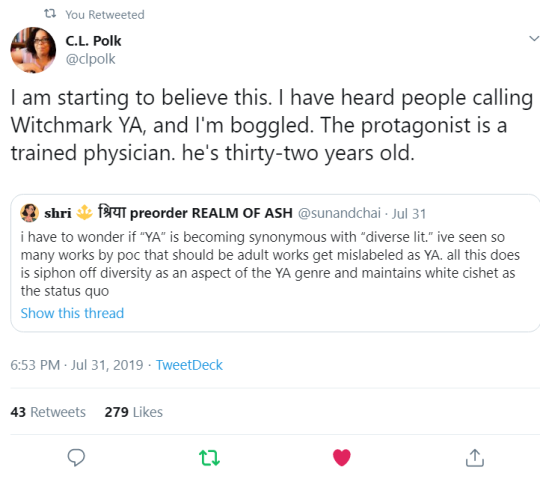
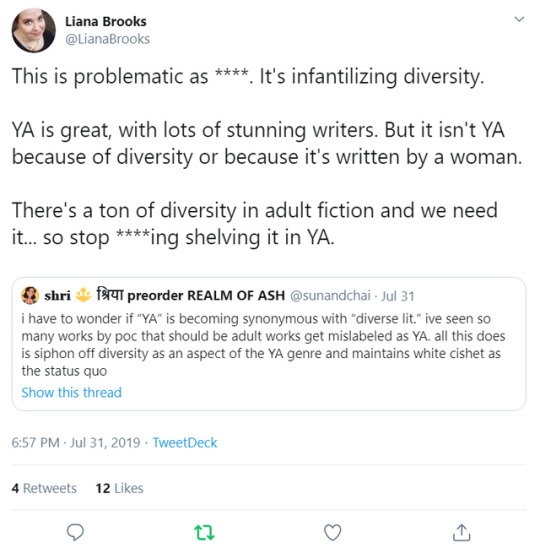
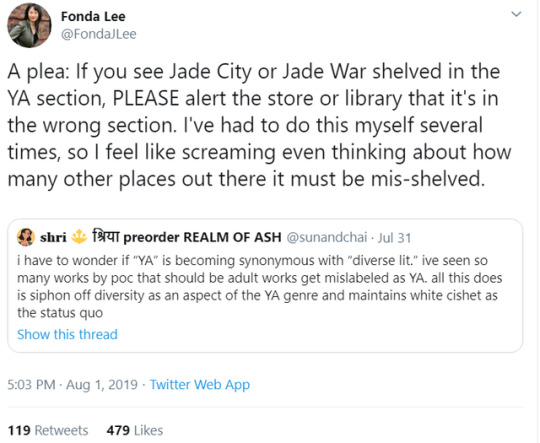
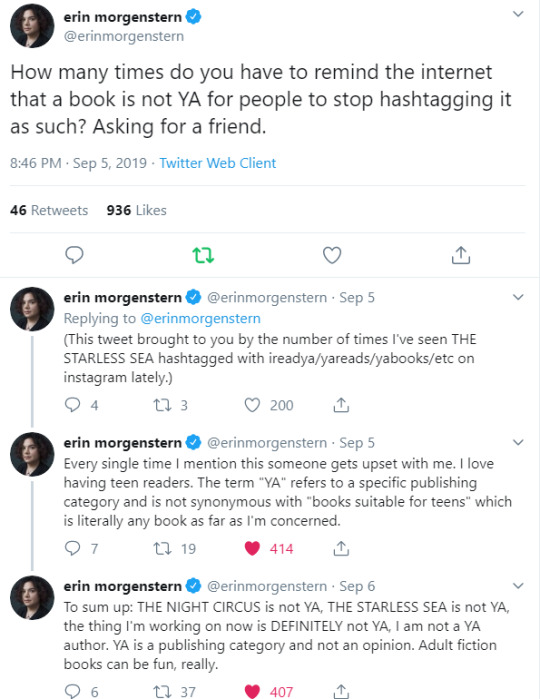
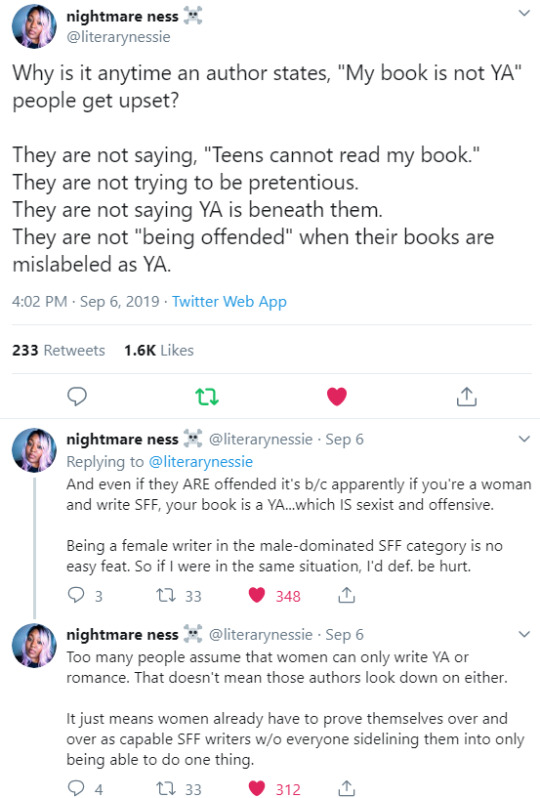
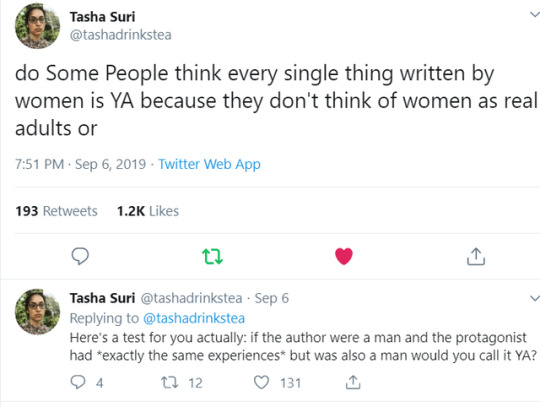

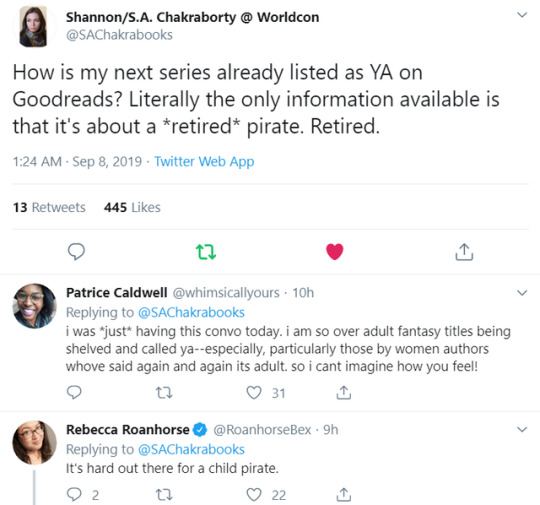
Fantasy books written by women are often assumed to be young adult, even when those books are written for adults, marketed to adults, and published by adult SFF imprints. And this happens even more frequently to women of color.
This topic’s an ongoing conversation on book Twitter, and I thought it might be worth sharing with Tumblr. And by “ongoing,” I mean that people have been talking about this for years. Last year, there was a big blow up when the author R.F. Kuang said publicly that her book The Poppy War isn’t young adult and that she wished people would stop calling it such. If you’ve read The Poppy War, then you’ll know it’s grimdark fantasy along lines of Game of Thrones… and yet people constantly refer to The Poppy War as young adult – which is one of its popular shelves on Goodreads. To be fair, more people have shelved it as “adult,” but why is anyone shelving it as “young adult” in the first place? Game of Thrones is not at all treated this way…
Rebecca Roanhorse’s book Trail of Lightning, an urban fantasy with a Dinétah (Navajo) protagonist has “young adult” as its fifth most popular Goodreads shelf. The novel is adult and published by Saga, an adult SFF imprint.
S.A. Chakraborty’s adult fantasy novel City of Brass has “young adult” as its fourth most popular Goodreads shelf.
Tasha Suri’s Empire of Sand, an adult fantasy in a world based on Mughal India, has about equal numbers of people shelving it as “adult” or “young adult.”
Book Riot wrote an article on this, although they didn’t address how the problem intersects with race. I also did a Twitter thread a while back where I cited these examples and some more as well.
The topic of diversity in adult SFF is important to me, partly because we need to stop mislabeling the women of color who write it, and also because there’s a lot there that isn’t acknowledged! Besides, sometimes it’s good to see that your stories don’t just end the moment you leave high school and that adults can still have vibrant and interesting futures worth reading about. I feel like this is especially important with queer rep, for a number of reasons.
Other books and authors in the tweets I screenshot include:
Witchmark by C.L. Polk
A Ruin of Shadows by L.D. Lewis
The Starless Sea by Erin Morgenstern
The Day Before by Liana Brooks
A Phoenix First Must Burn edited by Patrice Caldwell
Shri, a book blogger at Sun and Chai
Vanessa, a writer and blogger at The Wolf and Books
TLDR: Women who write adult fantasy, especially women of color, are presumed to be writing young adult, which is problematic in that it internalizes diversity, dismisses the need and presence of diversity in adult fantasy, and plays into sexist assumptions of women writers.
71K notes
·
View notes
